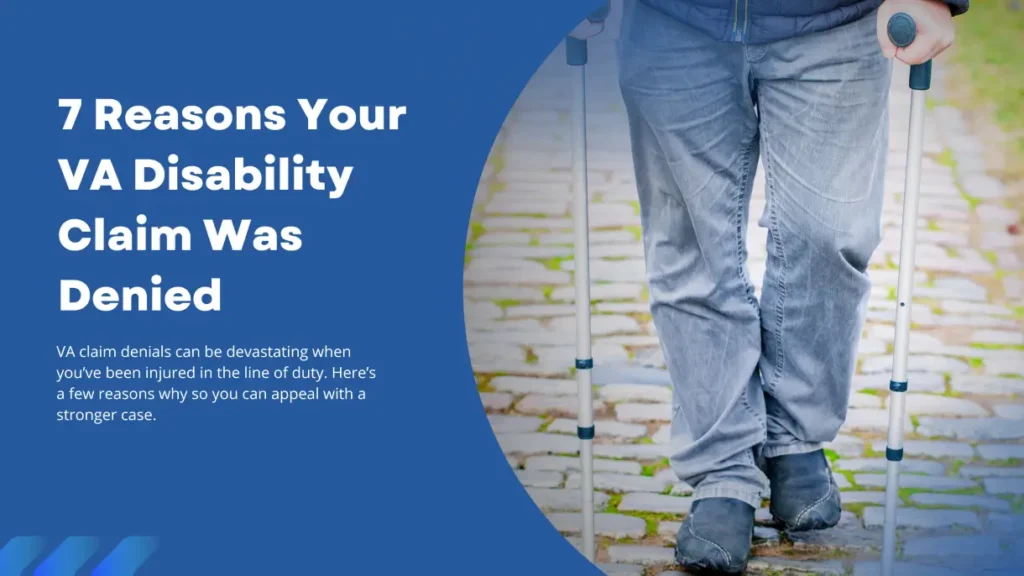Facing a VA disability claim denial can be frustrating and discouraging, especially when you’re dealing with the physical and emotional challenges of a service-related condition. Navigating the Department of Veterans Affairs for disability benefits presents additional challenges, such as backlogged claims, long wait times for decisions, and high denial rates. Many veterans find themselves unsure of the next steps or how to improve their chances in the appeal process. Understanding why claims get denied and knowing the available options can make a big difference. This guide walks you through essential steps and strategies to increase your odds of a successful VA disability claim application.
What to Do If Your VA Disability Claim is Denied: Key Takeaways
- Gather comprehensive medical evidence from both VA and private providers to ensure you meet the VA’s requirements.
- Establish a clear service connection by using records, testimonies, and medical documentation showing how military service contributed to your service connected disability.
- Understand the importance of disability compensation by ensuring you have a service-connected diagnosis and sufficient evidence to support your claims, as many initial applications are often denied for lack of these critical elements.
- Complete all application sections accurately, paying close attention to documentation details to avoid incomplete information.
- Schedule and attend the C&P exam with a qualified examiner to confirm the extent and cause of your disability.
- Monitor all submission deadlines and contact the VA if you require extensions to avoid automatic denials.
- Consider professional legal support to help you navigate complex claim and appeal processes.
Most Common Reasons Your VA Disability Claim Was Denied
- Lack of medical evidence
- Lack of service connection
- Missing or incomplete data and documentation
- Condition or severity doesn’t qualify as a disability
- Failed C&P exam
- Missed application and submission deadlines
- Lack of legal representation
Lack of Medical Evidence
One of the leading causes of VA disability claim denials is insufficient medical evidence. Without a thorough record that connects your condition to military service, it’s challenging for the VA to confirm eligibility. Medical evidence needs to clearly document both the existence of the disability and its impact on your daily life. The VA looks for specific details, including treatment records, medical diagnoses, and the severity of symptoms.
To strengthen your case, gather comprehensive documentation from both VA and private healthcare providers. Ensure that your doctor includes a medical nexus statement explaining how the condition is linked to your military service. Providing evidence from multiple sources can make a substantial difference in meeting the VA’s requirements and improving your chances for approval.
Lack of Service Connection
For a VA disability claim to be approved, you must establish a clear link, or “service connection,” between your condition and your military service. A common reason for denial is the VA’s determination that the disability did not originate or worsen due to service-related activities. Without this connection, claims are often denied or assigned a lower VA rating, reducing eligibility for benefits.
To strengthen your service connection, gather service records, medical documentation, and if possible, “buddy statements” from fellow servicemembers who can testify to events or injuries that occurred during your service. Medical professionals can also assist by providing expert opinions that tie your disability to specific events or exposures during your military career. Establishing a strong service connection can help improve your chances of a successful claim or appeal.
Missing or Incomplete Information & Documentation
Incomplete information or missing documents are frequent reasons for VA claim denials. When the VA denies claims, it is often due to missing or incomplete information and documentation. The VA requires detailed records about your service, medical history, and disability to evaluate your claim accurately. Missing crucial details, such as service dates, medical provider information, or specific treatment records, can lead to immediate denial, as the VA may interpret gaps as lacking evidence.
To avoid this issue, double-check that all forms are fully completed and reviewed. Ensure that each section includes accurate information on dates, locations, and supporting details about your disability. It’s also wise to seek a secondary review, whether from a trusted advisor or a VA-accredited representative, to catch any overlooked items. Submitting a well-documented, thoroughly checked application can help minimize the chance of denial.
Condition or Severity of Condition Doesn’t Qualify as a Disability
Not all conditions meet the VA’s standards for veteran disability benefits. Even if your symptoms stem from a service-related incident, the VA may determine that your condition isn’t severe enough to qualify. This typically happens when symptoms are mild or the impact on daily functioning is limited, resulting in a low disability rating or outright denial.
To address this, ensure your condition is properly diagnosed and that medical records detail the severity and frequency of your symptoms. Documentation from a medical provider that explains how the condition impacts your ability to work and engage in everyday activities is essential. In cases where your condition worsens over time, additional medical evaluations can support a higher disability rating. Ensuring a clear and specific diagnosis that matches VA standards can help improve your claim’s chances of success.
Failed C&P Exam
The Compensation & Pension (C&P) exam is a crucial part of the VA disability evaluation process, as it helps the VA assess the severity of your condition and its connection to your military service. Missing this exam or receiving an unfavorable evaluation often results in claim denial. Many veterans face challenges during these exams, such as rushed appointments, unqualified examiners, or missed appointments due to scheduling issues.
To improve your chances, prepare thoroughly by understanding your medical history and symptoms. Arrive ready to discuss how the condition impacts your daily life. If possible, request an examiner who specializes in your condition. If you experience issues during the exam, promptly report them to the VA. Being proactive and prepared for the C&P exam can help ensure a more accurate evaluation and support your claim.
Missed Application and Submission Deadlines
Missing deadlines is a common reason for VA disability claim denials. Although there’s no deadline for filing an initial claim, strict timelines apply when submitting additional evidence or filing an appeal after a denial. The VA generally requires appeals within one year of the initial decision; failure to meet this deadline often results in forfeiting your right to appeal and may require starting the claim process from scratch.
To avoid missing critical deadlines, create a schedule that includes all upcoming VA submission dates. If you’re unable to meet a deadline, contact the VA as soon as possible to request an extension. Tracking and adhering to these timelines is essential to keeping your claim active and improving your chances of a successful outcome.
Lack of Legal Representation
Navigating the VA disability claims process alone can be challenging, especially with complex requirements and strict standards for evidence. Many veterans attempt to file claims independently but face denials due to overlooked details or insufficient evidence. Without legal expertise, it’s easy to miss critical steps that could strengthen your case.
Having a VA-accredited lawyer or representative can significantly improve your claim’s outcome. Legal experts understand the intricacies of VA policies, can guide you in gathering the right evidence, and ensure your application meets all necessary criteria. A knowledgeable representative can also help you navigate the appeals process if your claim was previously denied. Professional assistance is a valuable asset in maximizing your chances of receiving the benefits you deserve.
My VA Disability Claim Was Denied. Should I Appeal the Ruling?
After receiving a VA disability claim denial, veterans have options to challenge the decision through the veterans appeals process. The two main routes are filing an appeal to the Board of Veterans’ Appeals or requesting reconsideration. Understanding the difference between these options can help you decide the best path for your case. An appeal involves formally challenging the VA’s decision by submitting new evidence or seeking a review from a higher authority. Appeals must be filed within one year of the denial notice, and although they may take time, they provide an opportunity for a fresh review of your claim.
Work With a VA-Accredited Lawyer to Improve Your Odds of Approval
When facing a VA disability claim denial, having a VA-accredited lawyer by your side can be invaluable. Experienced VA disability lawyers understand the intricate requirements of the claims and appeals process, from gathering additional evidence to structuring arguments that meet VA standards. Legal representation can reduce the burden on veterans by managing complex paperwork, deadlines, and appeals, allowing you to focus on your health.
Accredited lawyers can also improve your odds by effectively arguing for a higher disability rating if your condition is severe. They’re familiar with common pitfalls in the claims process and know how to avoid issues that lead to denial. Choosing a reputable VA-accredited lawyer provides you with knowledgeable support and increases your chances of receiving the benefits you’ve earned.

